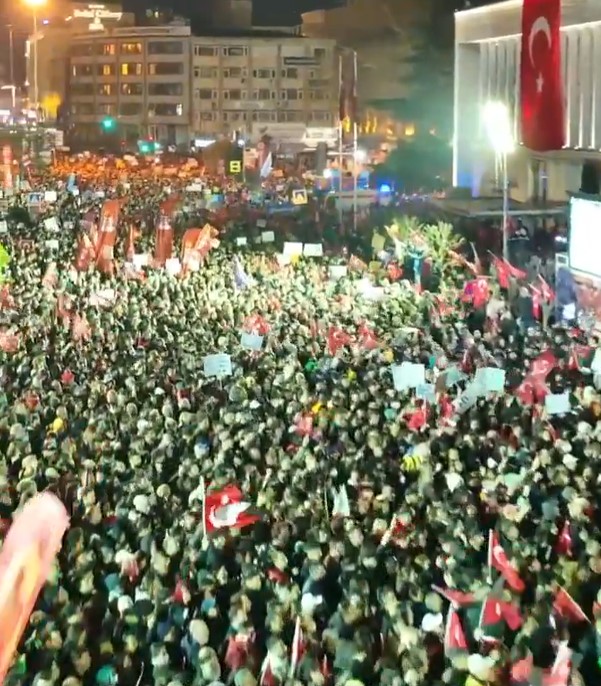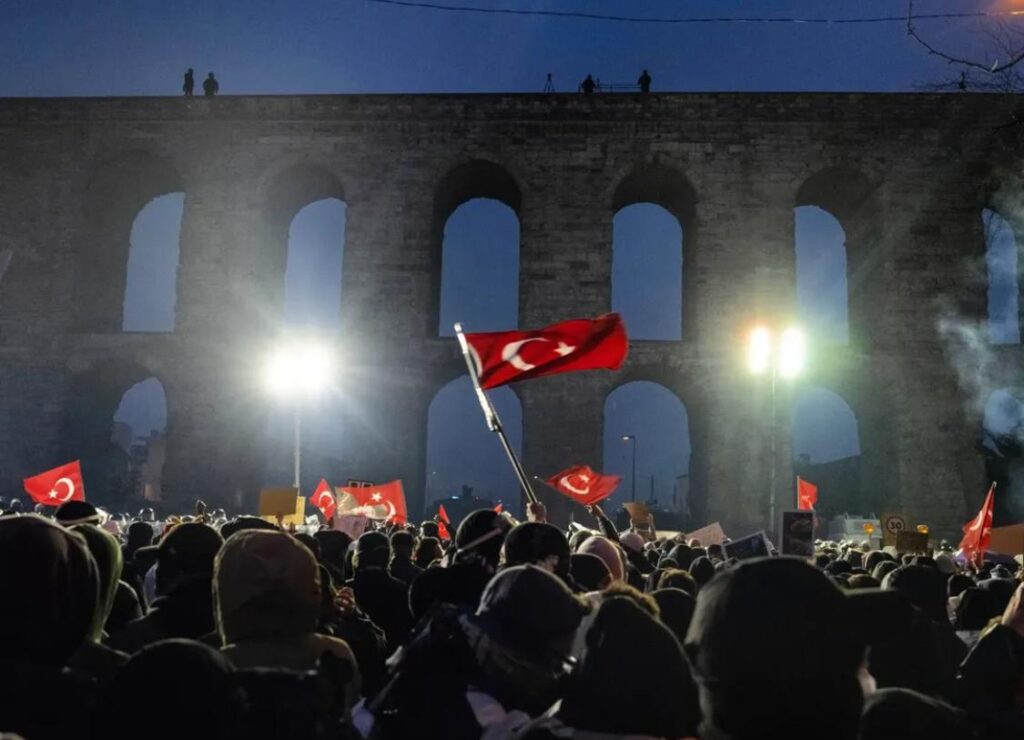Report from Ali Cevahir in Istanbul
For the sixth consecutive day, hundreds of thousands of Turks have protested against the arrest of the opposition leader and mayor of Istanbul, Ekrem İmamoğlu, along with dozens of members of his CHP party. Middle East Eye reports that demonstrations are now taking place in 55 out of 81 provinces.
As the demonstrations have continued, police have used pepper spray, water cannons and have arrested over a thousand demonstrators. The government have threatened to treat demonstrators as “terrorists” and have blocked over 700 accounts on ‘X’, that are associated with opposition and human rights organisations. Elon Musk’s ‘X’, of course, has cooperated.
The popularity of İmamoğlu is evident from the primary vote that made his CHP candidate in the next presidential election. Including 1.3mn party members who voted, there were ten times that number of public ‘solidarity’ votes, and the total supporting him 15mn, was more than the CHP received in the last elections. We have been sent this report from Ali Cevahir in Isantbul, who has been participating in the demonstrations:
The most popular slogan of the protests is: “There is no individual salvation. Either all together or none of us.” This slogan encapsulates the diverse opposition, including socialist parties, LGBTQ+ groups, social democrats, secularist Kemalist nationalists, trade unions, student organisations, bar associations, medical associations, and teachers’ unions.

Student protests have emerged as one of the most dynamic elements of the movement. Today, students responding to boycott calls in universities are leading the largest mass actions in both campuses and streets in years.
Facing an uncertain future, precarity, job insecurity, and high unemployment, students have reacted most strongly against Erdoğan—especially following the decision to cancel Ekrem İmamoğlu’s diploma. The chant “Erdoğan without a diploma” has become one of the most frequently heard slogans.
Overwhelmingly young people on the demonstrations.
The overwhelming majority of the crowd that gathered in front of the municipality building consisted of young people aged 18-30 probably two thirds of the 300,000 protesters present. Many of them were children during the Gezi Resistance in 2013, while others were in their twenties at the time and who have now returned to the streets once again.
A defining characteristic of this movement is that participants do not feel affiliated with any particular party or organization. Although the activists’ ideological stance is shaped by opposition to Erdoğan and the [ruling party] AKP’s Islamist-nationalist policy, their inspirations vary. Some emphasise Mustafa Kemal Atatürk, the founding leader of the Republic of Turkey, while others draw inspiration from Deniz Gezmiş and his comrades, who were executed in 1971.
Unfortunately, trade union participation remains mostly symbolic, and the organised working class has yet to take on a leading role beyond localised protests. As of now, the protests are largely dominated by students and youth, with white-collar workers, the unemployed, part-time and non-contracted employees, as well as service sector and clerical workers.
Solidarity and resistance are deeply inspiring
Another striking aspect of the protests is the strong feminist discourse against the reactionary and misogynistic policies of the AKP. There is widespread opposition to gender discrimination.

A third key issue driving the protests is the deep-rooted corruption associated with the AKP, the politicisation of the judiciary, and the collapse of the justice system. The demonstrations are not characterized by desperation but by enthusiastic and determination.
Police forces have responded with brutal and disproportionate violence, particularly after many protesters begin to disperse at night. Police often target smaller groups or attack as demonstrations wind down. While this provokes outrage on social media, it also reflects a recurring pattern. Unfortunately, trade unions and political parties are not well-organised to counter police aggression, leaving young protesters to learn self-defence and resistance tactics on their own.
While the media attempts to frame minor incidents—such as a few fireworks—as vandalism, protesters have no means of self-defence beyond their own bodies. In a country where fundamental human rights, including voting rights, freedom of expression, freedom of assembly, the right to protest, and the right to strike, are systematically violated, the solidarity and resilience displayed in these demonstrations remain deeply inspiring.
Following the arrest warrants announced on Sunday, calls emerged for a general strike, along with boycotts of certain brands and products. However, the most prominent action at the moment remains the university boycotts, and the mass demonstrations.
In short, Turkey is a country on the brink of significant change, where people may be unhappy, but they remain hopeful for the future.



